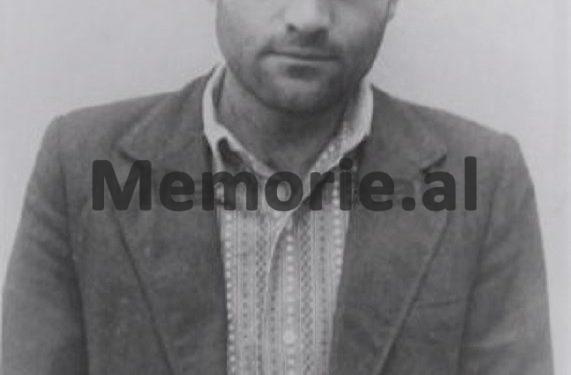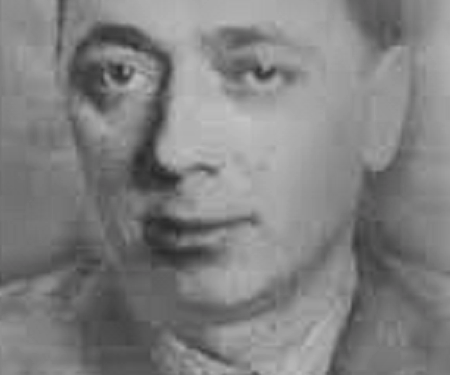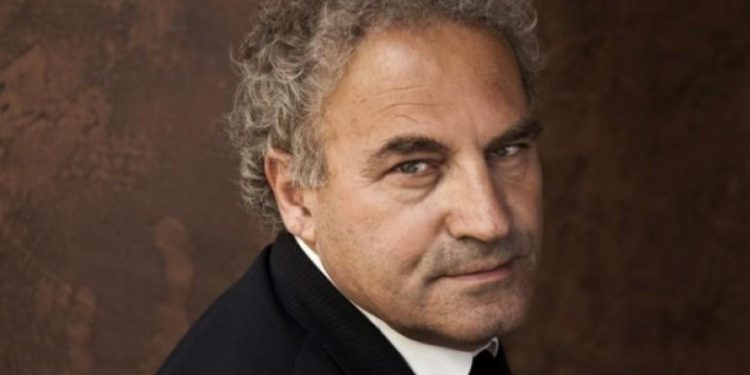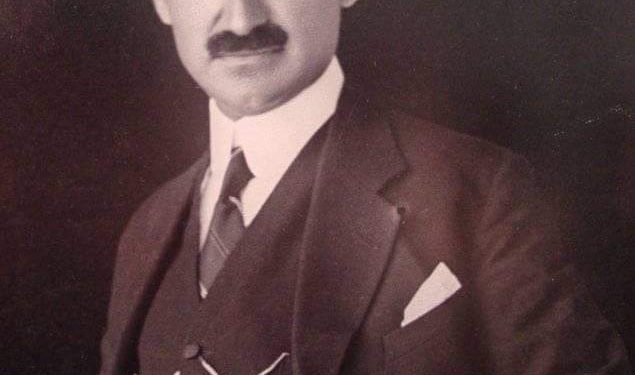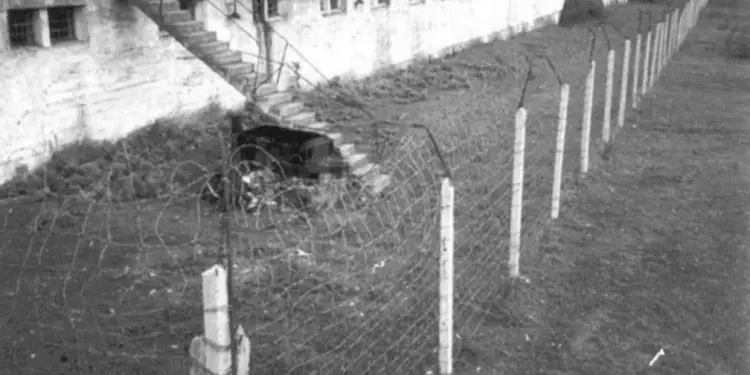From Visar Zhiti
PORTRAIT FOR KUDRET KOKOSHIN
Memorie.al / Kudret Kokoshi is the son of a noble family of patriots with many executioners from the city of Vlora, such as: Qazim Kokoshi, signatories of Independence with Ismail Qemali in November 1912, while Astrit Kokoshi was killed by the Italians as an anti-fascist, while Avdyl Kokoshin was shot by the communist regime of Enver Hoxha immediately after the end of the War, with the “Group of Deputies”. In the same way, Meto Kokoshin is shot in front of his brother, Kudreti, an unfortunate poet, who himself was sentenced by shooting and then to life imprisonment. And the Monarchy of Zog had treated him as an opponent, while April 7, 1939, found him in Korça, in the big demonstration, looking for weapons of freedom…!
Even though he graduated from the university in Rome, got a doctorate in Law and studied Literature and Philosophy (he wrote virtuosic sonnets in the Latin capital), even though he committed himself as an anti-fascist and patriot, he was crucified…!
Being a state judge in Prizren (according to his story) in conflict with the old (Serbs) and new (Italians) invaders, he is at the head of the ’42 demonstration in Prizren (and wounded he writes verses), in the square they assassinate him, hit him with a stick, break his skull (even a dead person had that mark), they left him there, finished. A Kosovar saves his life.
Mr. Kudret Kokoshi told me (wise, with the cantilena of his voice leaving, as he confessed, he mixed the fate of his homeland with that of his life as if they were the same thing), in the only meeting I had, by the bedside of death, while I was giving an interview to the largest opposition newspaper: – “In Kosovo, they elected me as the head of the Intellectual Youth, even though I was from Volonia. I remember Selman Riza. Have you been to Prizren”?
(… bitter smile…)
– “I was also in (not) the Mukje agreement. I got the impression that not all the leaders wanted martyred Kosovo. When the political fratricide started there again, I ran away, I’m sensitive, I can’t stand it”.
Kudreti is spied on by the Serb-communists, captured by the Gestapo and exiled…!
– “Then in Vienna, in the Bycyrkli camp, full of Montenegrins, Serbs, Albanians, Jews. In the forests of Austria I worked as a slave…! A German doctor saves my life again. Being a friend of Krist Maloki, he also respected me for the poems I had published in magazines and my writings about Lasgushi. The Russian army comes and I am operated on for congestive leg. I was invited to work in France, where I had friends, but I preferred my homeland and…”!
The Serbian communists, by order of Dushan Mugosha, arrest him and hand him over to the fratricidal Albanian Sh.P…!
– “They sentence me to life imprisonment and where? In my Vlora. Accusation: being a knowledgeable person, I influenced to increase the ranks of the National Front”.
In court, he answers stoically with his own anti-fascist lines…!
The women of Vlora refuse to demonstrate against him, as they were ordered. Maybe they had heard about the song you wrote for them during the war: You are beautiful and brave! I sing a song of bravery to you Albanian woman…!
And he spends four times more years in prison than the Second World War lasted. Ironically, the woman with the young children shared it. But his brother and sister-in-law, who brought him to prison, kept him alive.
In all the prisons of Albania they talked about him even when he was not there! His position was learned by heart, it was told to the other, and they were passed from mouth to mouth between terror and hunger like a good word, like a piece of bread from season to season, from year to year. And the dictatorship did not change and asked its poets to weave poems as another barbed wire fence around life.
Meanwhile, Kudret Kokoshi was released. Surprisingly, his shocking poem “The Return”, an elegy worthy of any Albanian anthology, like many of his poems, was put in prison.
But his freedom is now heavier than war and more offensive than prison. Completely miserable, he finds a room in the “Rorogozi” inn. Because he knew Enver Hoxha, he wrote to him (rather as a rebellion) that the anathema should not continue throughout his life. Dictators are capricious. Instead of the young man punishing him for the letter, he was ordered to work as a translator. 17 years translated from Albanian to Italian, literature of the socialist era: Kadarenë, Agollin, Arapin, Xoxen, etc…!
I asked her:
– Did the translation give you pleasure, did it compensate, however little, something inside you?
– “The novel “Castle” yes. And “Dead River” and a part of poems…”!
– The quality of your translations has been high, sometimes brilliant, and yet your name was not mentioned, when even a useless article, such as a brigadier’s order or a policeman’s order, has your name in all our newspapers. What is this unfortunate slavery in “the most advanced method in the world”, socialist realism? Have you translated political works?
– “I rejected them on the pretext that I don’t know what they mean.”
– However, their intrigue is very banal, like the propaganda of a semi-illiterate person who has finished the party course and is a bureau member or director.
The white old man smiles bitterly. Maybe it was the last smile in hell that his soul was getting ready to go to heaven.
– “I feel classic myself” – I hear the poet’s voice again, which drips like the sounds of a persecuted twilight. – I am against hermeticism, even more so against the imprisoning hermeticism of man, I am against the symbolism of ideals; I like free verse and freedom. The Normans, Goths, Longobards, Ostrogoths, Romans, Slavs, Ottomans, etc. could not destroy our people, but we have to protect it from ourselves, not to destroy it.
– Which has been more difficult for you, for talent, translating mediocre literature or imprisonment?
– “So…almost the same…”!
– Where was it more difficult, in the Pristina camp, during the war, in Nazi Germany, exiled or imprisoned in the Burrell of socialism?
– “In Burrel…! Oh, once, it was cold, at -17 o C., they put us in the dungeon. The shadows of the ice hung like fangs, so that we would come out alive the next day, we would warm each other with our bodies…! We need each other…! I’m not a hermit… I don’t want to be alone…”!
– Your poetry has not left you alone, – I insist. And I told him what was said about his song.
It seems simple, with rhythm and rhyme, with white verses, strophic, whose forms and changes like waves, the spirit is popular Labe, mixed with European stylistic culture, difficult sonnets, written in Italy against Italian occupation and pride visible, like those rocks of Vlora on the coast and deep, natural love for Albania stuck in the ribs of the poet and the prison turrets.
As much as he is a poet of history to the point of legend, he suddenly breaks the line like a sledgehammer and becomes an intimate poet, he sings to his mother and sister, love and disappointment, a distant memory, then a hero, a city.
Are these the only virtues of his poetry? These are all the poems, an old notebook, carefully written, like a renaissance butchered with the hand that held the heavy shackles?
It is not known. He improvised, says his student, who collected his poems, who took private lessons in foreign languages. The dictations he gave were pessimistic outpourings, pieces of poetry that were made to him instantly, a testament of his soul. They resemble somewhat Buxatian sketches.
Then one day, quite suddenly, it was the year 1986, Professor Kokoshi, without being sick, said that he was sick and would no longer teach. Indeed, the sessions were semi-illegal, because you wanted to learn French, Italian, you were not seen with good eyes, but with them he made a living. Hadn’t he decided to die in a hunger strike?! Oh God!
But the poet’s brother and the poet himself hinted to the student’s father what had happened: he had been robbed, Sigurimi had locked him in a hotel room in Fier, and they had asked for his cooperation.
Kudret Kokoshi, 78 years old, like a tired Jean Valjean, tall like the heroes of his poems, categorically refuses. He returns more killed than ever. Why would they ask him for this now?! Wasn’t his spirit weakened? No no. And he closed himself in his house, eavesdropped by the neighbors, the neighborhood council, the actions, the professional spy, the police, the party, plenums, liberation parties, socialist realism.
At the end of the interview, when I was asking him to give me something to publish in the opposition newspaper where I worked, while I was sitting next to his head, before death, as if I were a minister of religion, waiting for the last word, the truth:
– “I will not give them my epitaph…” – he concluded. His voice was fading like the stars. What enigma was hidden there? What was carved on that stone, which burdens all death? Did it take or give power to the storm? Meanwhile, he never wrote many poems (he sacrificed himself), but by the sea, secretly, he muttered to his friends. They were completely dissident. Unfortunately, he took them with him to the grave, forever…!
And his poems for the first time there were declared free, on his newly opened grave. People threw fistfuls of earth over the coffin and rows, like almond blossoms, which were shaken by the wind, suddenly upon the death of De Rada. Light and soothing he fell, and, compared to ingratitude. Then the sheet metal sign with the name Kudret Kokoshi, 1907-1991 was stuck. It was the last year of the dictatorship…! Memorie.al




